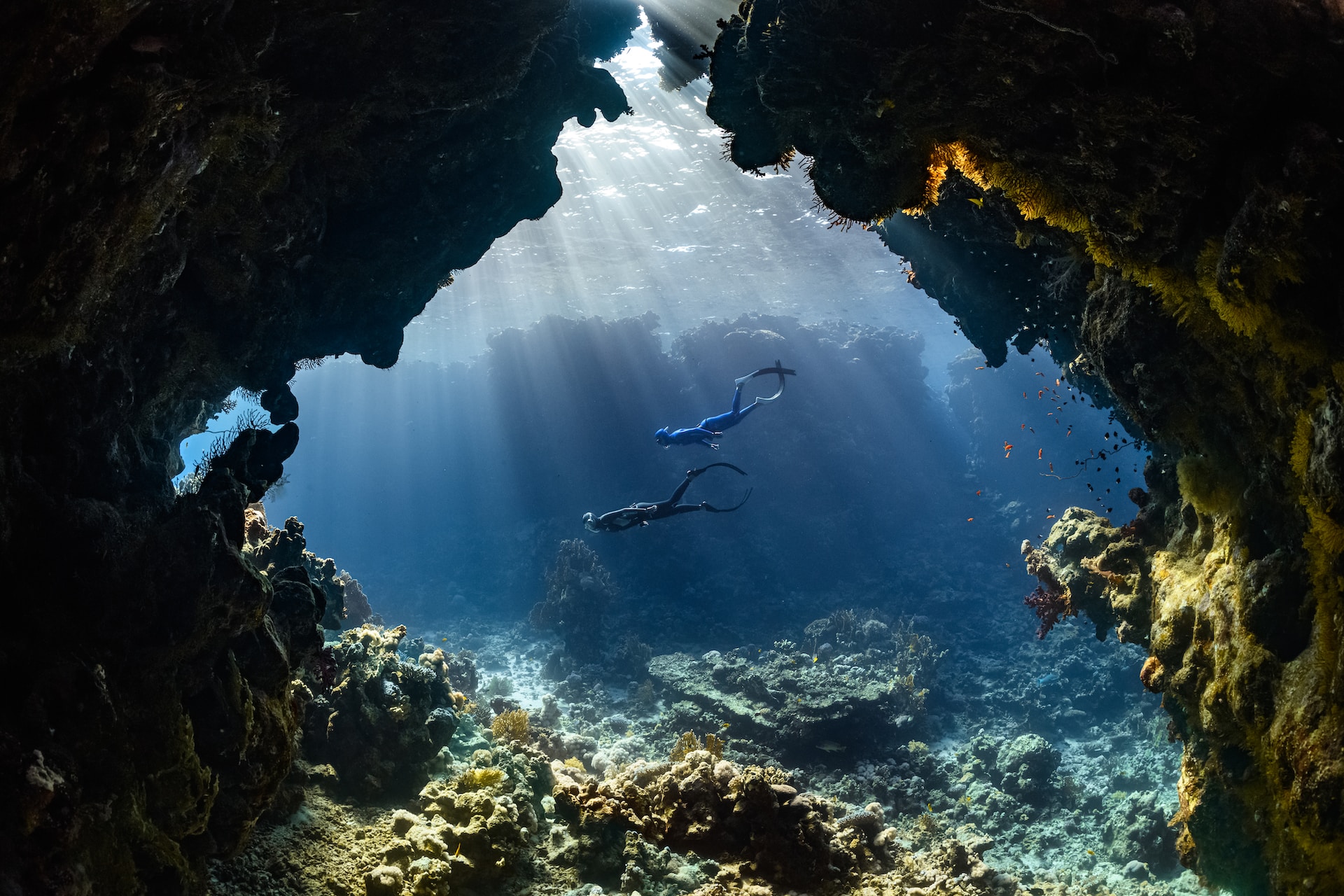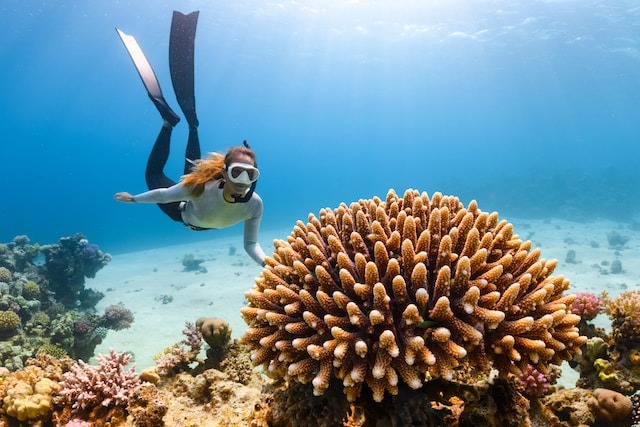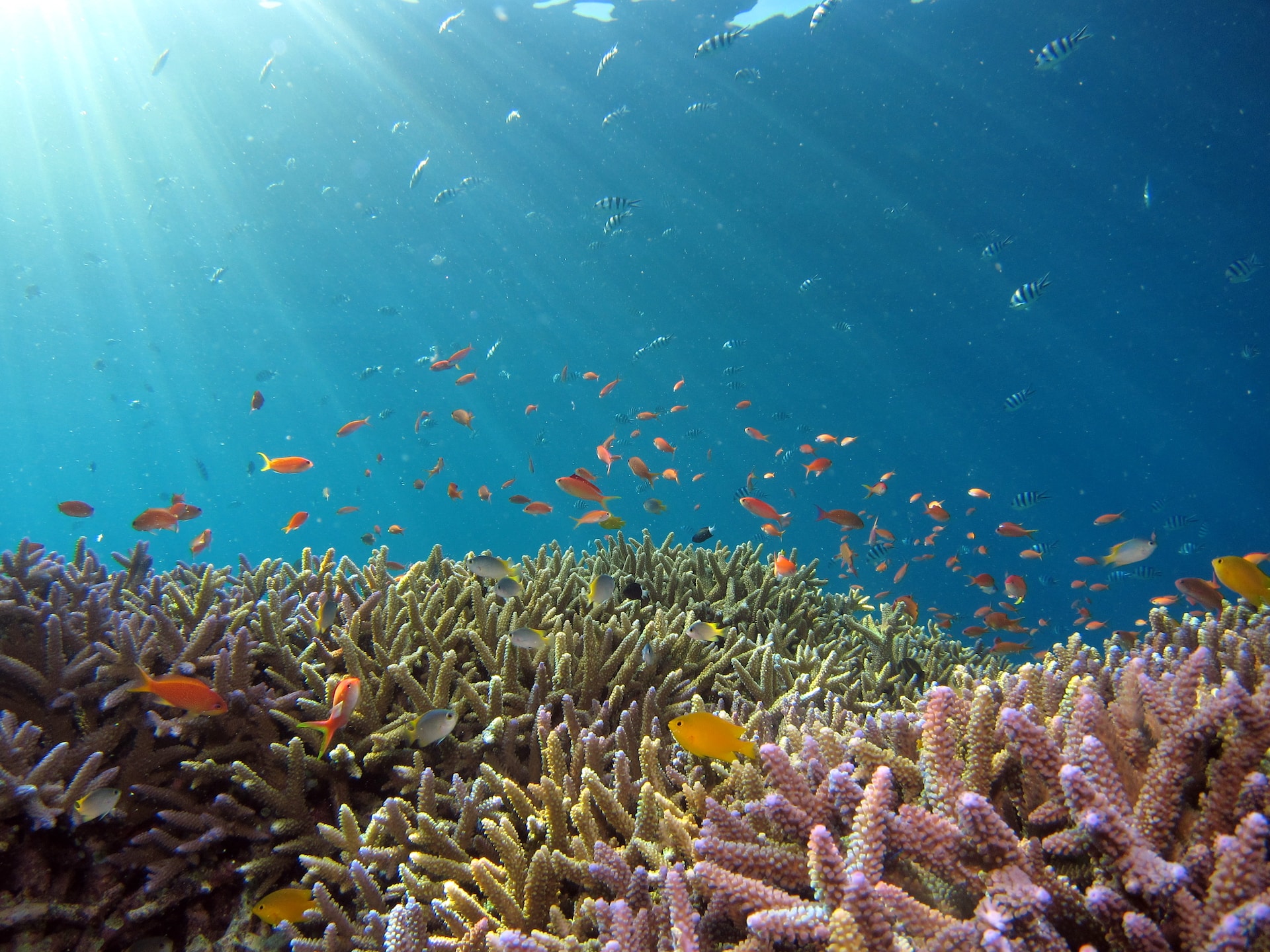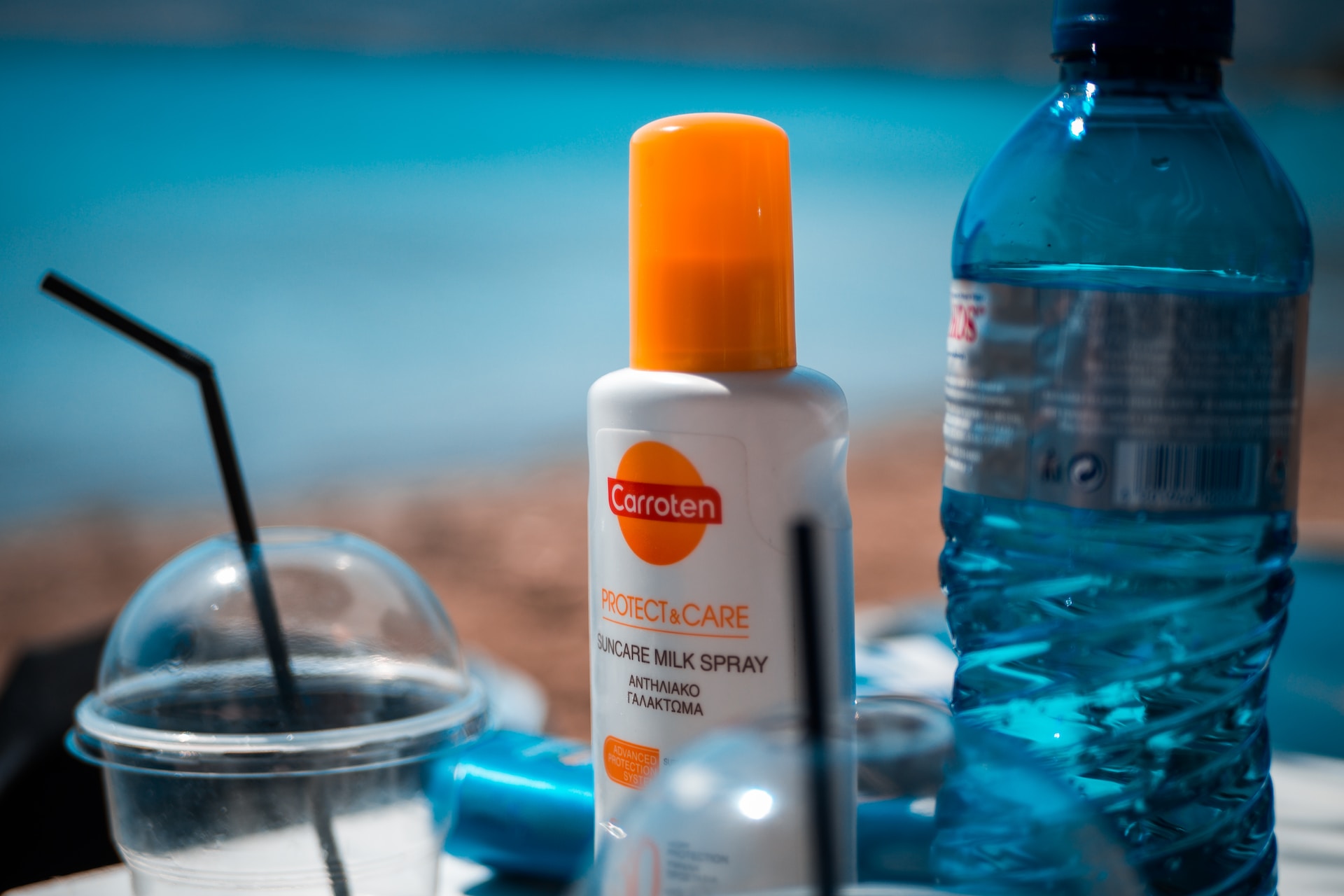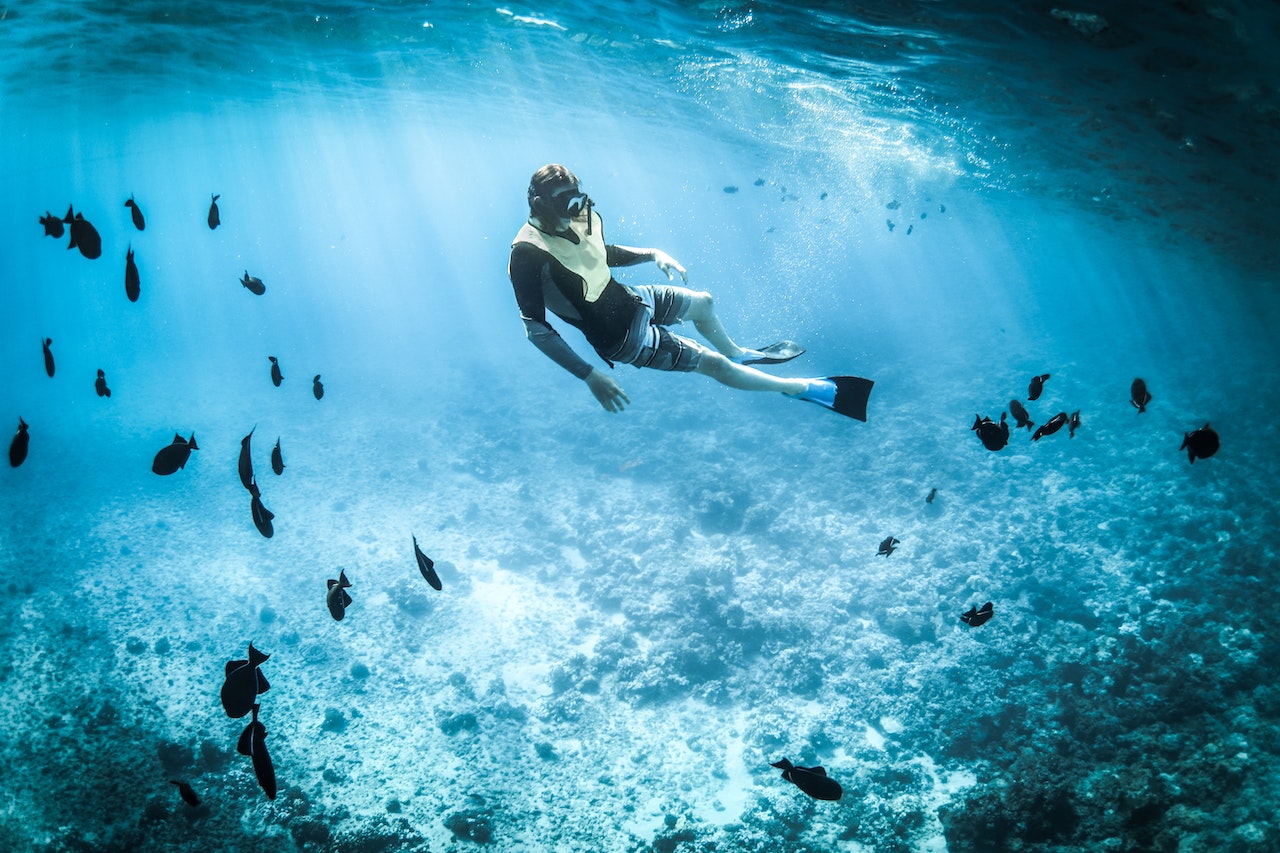When we think of a beach vacation, we often picture the sun, sea, and sand. But there’s more to the beach than what’s above the water. Beach resorts aren’t just for sunbathing and swimming – they’re also great places to discover underwater life. Over time, these spots have become popular for diving due to their diverse marine ecosystems, attracting snorkelers, divers, and marine scientists from all over.
Moreover, spending time at a diving or beach resort can spark an interest in marine life. Snorkeling, especially for beginners, lets you see fish and coral habitats up close. All you need is a diving mask and maybe fins, and it’s both fun and easy. Just be aware of a few minor risks like sunburn, jellyfish stings, or scratches from rocks or corals. If you’re new to snorkeling, what should you keep in mind? How should you behave around fish, corals, and other sea creatures? Here’s a quick guide on the right way to conduct yourself while you’re in the water!
Best Snorkeling Etiquette Tips
Exploring captivating marine life through snorkeling is a top-notch experience. Yet, to relish snorkeling and fully appreciate the underwater world while also upholding its beauty, it’s crucial to adhere to snorkeling etiquette. These are straightforward guidelines that ensure your safety and sea life’s preservation. Here are some pointers to help you become a conscientious and environmentally-friendly snorkeling enthusiast:
1. Be cautious not to use corals as support.
Even though their robust appearances might resemble rocks, it’s vital to understand that corals are actually fragile living entities. Unintentional contact or hitting them with your fins can result in severe damage. This happens because the protective mucous layer that encompasses their microbiome gets disrupted, potentially leading to lasting harm to the coral ecosystem. Recognizing that corals are integral to the marine environment, resisting the urge to touch or engage with them while snorkeling is crucial. By avoiding their use as footstools or any physical interaction, you contribute to the preservation of these valuable organisms and the overall vitality of coral reefs. This mindful approach ensures that these delicate structures remain resilient and functional for the future, enabling generations to come to appreciate their beauty and ecological significance.
2. Invest in high-quality snorkeling equipment.
When acquiring your snorkel gear, make sure to purchase from reputable manufacturers exclusively. Opting for quality snorkel gear is paramount not only for your own enjoyment but also for safeguarding marine ecosystems. Subpar equipment has the potential to break easily, leading to disruptions in your snorkeling experience and potentially causing harm to underwater environments. Choosing well-crafted and reliable gear from trusted sources enhances your safety, maximizes your enjoyment, and contributes to responsible snorkeling practices that protect the delicate marine world.
3. Avoid the urge to feed fish.
While the idea of enticing them with food might be alluring, it’s crucial to resist this temptation. Providing food to fish can have far-reaching negative consequences. Not only can it harm the delicate aquatic environment, but it can also lead to health issues for the fish themselves and disrupt their natural feeding behaviors. Moreover, feeding fish can introduce unbalanced diets and encourage unnatural fish aggregations in certain areas, leading to an imbalance in the marine ecosystem. This can result in the overpopulation of certain species and a decline in others, disrupting the delicate equilibrium that supports aquatic life. Additionally, human food may not provide the necessary nutrients for fish, potentially causing nutritional deficiencies and other health problems.
4. Maintain a hands-off approach to all marine life.
The fundamental principle of snorkeling is to refrain from physical contact with the underwater environment. Resist the urge to extend your reach and touch fish, corals, or any other creatures you encounter. Pursuing and gripping marine life can subject them to stress and harm. Adhering to this guideline is not only respectful to their habitat but also serves your own well-being. The ocean is home to various creatures that might sting or pose threats, and avoiding contact is the optimal way to ensure your safety. Even if you’re aware that a particular animal is non-aggressive, it remains imperative to grant it sufficient space for resting or hunting. This practice respects the natural behaviors and needs of marine life while allowing you to enjoy a secure and harmonious snorkeling experience.
5. Opt for biodegradable sunscreen.
Every beach enthusiast understands the importance of applying sunscreen. This protective skincare product is equally essential for snorkeling, as the activity exposes you to the risk of sunburn. Nevertheless, not all sunscreens are created equal. Most sunscreens available today contain oxybenzone and octinoxate, chemicals that have been identified as contributors to coral bleaching. The encouraging news is that there are alternatives at your disposal. Consider using UV-protective swimwear as an option, or opt for sunscreens formulated with zinc oxide or titanium oxide. These compounds are considered environmentally safer alternatives. By making this conscious choice, you play a part in safeguarding the fragile balance of marine ecosystems. This minor adjustment in your sun protection approach can contribute to preserving the breathtaking coral reefs and the diverse underwater life they support.
6. Adhere to the principle of “take nothing, leave nothing behind”.
Refrain from disturbing both living and inanimate elements such as corals, starfish, and sand. Avoid the temptation to pick them up for photos or as keepsakes to bring home. Similarly, ensure you depart with your own waste. This seemingly small action holds significant significance in curbing pollution that jeopardizes the oceans and beaches we hold dear. Moreover, consider going beyond the basics. Before departing the beach, you could gather litter and actively participate in the #Trashtag challenge. By doing so, you extend your commitment to preserving the natural beauty of our coastal environments. This collective effort signifies responsible enjoyment of nature and a tangible contribution toward ensuring that these breathtaking locales remain unspoiled for future generations to cherish and relish.
Incorporating these practices into your snorkeling routine not only enriches your personal experience but also contributes to the broader goal of preserving the oceans’ beauty and biodiversity. Your journey as a confident and responsible snorkeler is a journey towards becoming a steward of the marine world, making a positive and lasting impact on the environments you explore.
Conclusion
As snorkeling becomes a way for a lot of people to enjoy marine life, it is crucial to know and understand the rules and guidelines of snorkeling. By internalizing and applying these guidelines, you’re taking significant steps toward evolving into a snorkeler who is not only self-assured in their underwater adventures but also deeply committed to responsible practices. Furthermore, your confidence will grow as you become attuned to the marine environment and its inhabitants, navigating the waters with a heightened sense of respect and awareness. Understanding the fragility of underwater ecosystems and the delicate balance of marine life will enable you to move through these environments with a sense of purpose and consideration.

